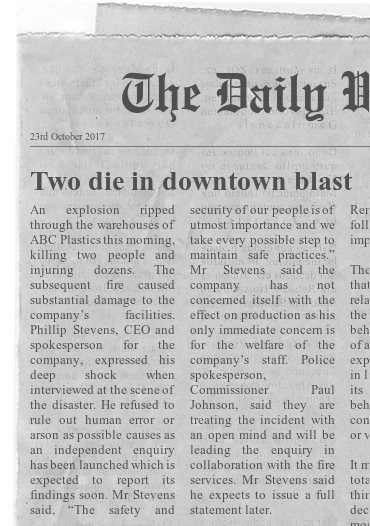
What do you do if a crisis occurs with your company or its products? Large organizations will have a communications team in place to deal with it. But what if your business is smaller?
Here are some tips on how to deal with the crisis and the media.
What’s your first priority in a crisis?
In any kind of incident, controversy or other potentially seismic event, the first priority is to tell the truth and tell it quickly. Failure to do so will lead to speculation, which will quickly multiply and the memory will be difficult to erase.
If there’s time before you talk to the media, contact your legal advisers. Always remember that the natural instinct of lawyers is to release as little information as possible, so you’ll have some protection should your crisis lead to legal action later.
However, lawyers alone shouldn’t make decisions about handling news about your company or its products. Many non-specialist legal eagles are inclined to view the media as the enemy, whereas the opposite is true if you manage your media relations properly. Lawyers tend to focus more on possible future litigation rather than developing good relations with news outlets.
If you’re an entrepreneur or you work for a small company that doesn’t employ a full time media relations executive, consider hiring a freelancer on a project basis.
A case study
To demonstrate the main principles, let’s imagine you’re the CEO of a plastics manufacturing business. There has been an explosion at your warehouse which has been severely damaged in the subsequent blaze. Two people are known to have died and dozens have been injured.
As the company’s designated media spokesperson, you have been contacted by reporters. You may be present at the scene where the intrusion of cameras and microphones will inevitably raise your stress levels, so you have to think clearly about how to react.
Never lie. Untruths will be revealed and the damage to your company’s reputation will be serious. Answer questions as briefly as you can.
Here’s how the interview can be managed:
Reporter: “Can you tell us what caused the explosion Mr Stevens?”
You: “There will be a full independent enquiry and I don’t want to anticipate their findings.”
Reporter: “We understand two people were killed and many injured.”
You: “That’s the information I have right now. We’re all deeply shocked, of course. Our hearts go out to everyone affected by this tragedy. I will be personally visiting the families in the next day or so to express the company’s support in this difficult time.”
Reporter: “You’ve had some recent labour problems. Do you suspect the fire was started deliberately?”
You: “We have no evidence of that but, as I say, the enquiry will investigate all possibilities, including arson.”
Reporter: “What about negligence. Are you satisfied that inflammable materials are always stored and handled correctly?”
You: “The safety and security of our people is of utmost importance and we take every possible step to maintain safe practices. Of course we can’t ever rule out human error but, again, I don’t want to second guess the enquiry.”
Reporter: “You’re in a highly competitive industry. Do you suspect someone from outside was responsible for the fire?”
You: “We have no information that would support such a suggestion. Legitimate, responsible competitors would never willingly put lives at risk.”
Reporter: “Presumably the police will open an investigation?”
You: “Of course and we will cooperate with them fully.”
Reporter: “Have you been forced to shut down production completely?”
You: “We’re not thinking about that now. Our only concern is for the welfare of our people who have been affected by this terrible tragedy.”
Reporter: “Will you be issuing a statement later when you have all the facts?”
You: “I certainly will, hopefully this evening. I again express my condolences to the families affected and to reassure all our staff that we will do everything we can to understand the cause of this incident and to prevent a similar occurrence in the future.”

Now let’s see how this interview might be treated in a short newspaper story on the incident:
The article presents the company in a caring and responsible light. Speculation about the cause of the explosion has been avoided and the company has expressed sympathy for all those affected.
Obviously management would quickly survey the damage and make contingency plans to keep the business running, but that information will be released later to placate shareholders and employees. The first requirement is to quickly get the facts reported and to discourage speculation.
As always, the truth can hurt in the short term, but in the long run it always comes out on top.
If you liked, then please subscribe to our YouTube Channel for video content. You can also find us on Twitter, Facebook, Instagram and Linkedin.




